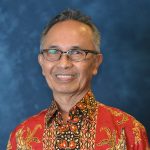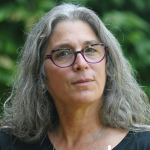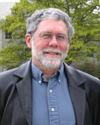Sumarsam, Gruen, Herbst Honored with Faculty Research Prizes

Three Wesleyan faculty were honored with the Wesleyan Prize for Excellence in Research in October. The third annual prize is similar to the Binswanger Prize for Excellence in Teaching, but is presented to members of the faculty who demonstrate the highest standards of excellence in their research, scholarship, and contributions to their field.
Each recipient received a plaque and citation as well as research funds for their award.
This year’s recipients include: Division I, Sumarsam, Winslow-Kaplan Professor of Music; Division II, Lori Gruen, William Griffin Professor of Philosophy; and Division III, Bill Herbst, John Monroe Van Vleck Professor of Astronomy.

Sumarsam is an internationally celebrated scholar of Indonesian music, a performer of gamelan, and also a dhalang, or puppeteer, of wayang. Among his many scholarly and artistic accomplishments are two landmark monographs, Gamelan: Cultural Interaction and Musical Development in Central Java (1995) and Javanese Gamelan and the West (2013). Through his research, teaching, and creative practice, Sumarsam has forever changed how we conceptualize the melodic structure of gamelan music. He has held numerous fellowships, including grants from the ACLS and the Yale Institute of Sacred Music, where he recently finished a year in residence. His achievements have earned him the Indonesian Satyalancana Kebudayaan award, for which the Indonesian Ministry of Education and Culture presented him a Presidential Medal. In 2018, Sumarsam was named an honorary member of the Society for Ethnomusicology.

Lori Gruen’s research consistently brings together diverse communities, each of which is enriched by interacting with thoughtful specialists outside of their field. As a leading scholar in animal studies and feminist philosophy, she has undertaken influential projects in multiple, prominent subfields in practical ethics. Additionally, she has engaged with the chimpanzee sanctuary movement for years. Gruen has been a leader in encouraging open dialogues between scientists and ethicists to define key questions and provide a better understanding of the value of stem cell research. She worked to form the first Embryonic Stem Cell Research Oversight (ESCRO) committee in Connecticut at Wesleyan and guided the establishment of similar bodies at other institutions in the state. Gruen teaches regularly in Wesleyan’s Center for Prison Education program. Her colleagues describe her work as the exemplary convergence of scholarship and activism.

Bill Herbst is a world expert in young, planet-forming stars. He has shown a sustained influence on the field, not just at Wesleyan, but in the international astronomical research community. He was a founding member of the long-standing Keck Northeast Astronomy Consortium, which has been awarded over one million dollars in private and federal grants, and he has been on the Observatory Council for the Association of Universities for Research in Astronomy, which manages most of the U.S. large ground-based telescopes and several space observatories. Herbst has built a research community and a subfield around a singular object that he discovered while at Wesleyan, and his influential research program has involved Wesleyan facilities as well as scores of Wesleyan students.

